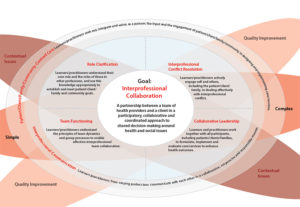Health-care providers across different professions work closely together to provide the best care for their patients. Interprofessional collaboration has many benefits for patients, providers, and the health-care system. Inter-professional collaboration has always been central to rural practice. Click the expandable menu below for individual articles about how Alberta health providers have mastered the art of inter-professional collaboration.
Better Health Care through Interprofessional Collaboration
Interprofessional collaboration occurs when multiple health workers from different professional backgrounds work together with patients, families, caregivers, and communities to deliver the highest quality of care.
Driven by necessity, rural practitioners build strong collaborations with other providers to better care for their communities.
Interprofessional collaboration has many benefits:
- Improved communication, coordination, and partnerships between health providers, patients and their families, and less risk for patients to ‘fall through the cracks’.
- Better care for patients with complex and/or chronic conditions because joint expertise can address the broader factors that influence health (i.e. social determinants of health) in the care plan.
- Better patient experience and higher satisfactions with their care.
- Supportive health-care practice through meaningful contact with other health professionals.
- Improved access to services and more effective use of health resources.
There are many great examples of inter-professional collaboration in rural areas.
While the benefits of collaboration to patients are clear, effective collaboration is not always easy to achieve. First, it requires trust and respect between providers and the sense that each member is valued. Traditional hierarchies in the health-care system can sometimes get in the way of sharing decisions for care. Not understanding each other’s scope of practice can lead to efforts to protect professional ‘turf’. The work environment might not always facilitate collaboration.
Health professionals need to learn and practice special competencies to become good collaborators.
Competencies are the knowledge, skills and abilities health care provider need for better patient outcomes.
There are many initiatives that help health sciences students and professionals to become more proficient in collaboration:
- In some medical and health sciences programs, students have an opportunity to do an interprofessional clinical placement. These experiences help students to understand the roles of other health providers, practice collaboration, and potentially influence the choice for rural practice.
- The University of Alberta has created an Interprofessional Learning Pathway that links a series of courses and practice experiences into a comprehensive collaboration curriculum.
- Through RhPAP’s ‘Let’s Go Rural!’ program, post secondary students can team up to get early exposure to rural health-care practice. Feedback from participants suggest that these collaborative events are great opportunities to learn with others about rural practice. They may also spark an interest in rural practice.
- RhPAP offers several programs for rural health-care teams to train together, such as the Emergency Department Echo (EDE) program and the Financial Incentive for Rural Staff Training (FIRST).
Interprofessional collaboration is a way to achieve better patient care while at the same time having a happier and more effective workforce.


